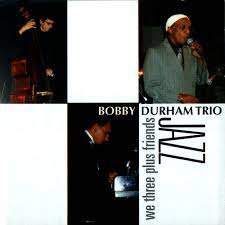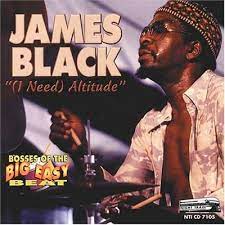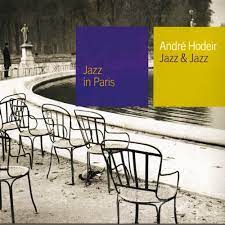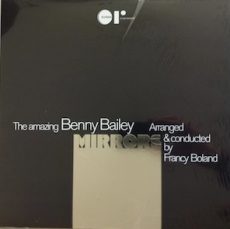
Daily Dose Of Jazz…
Bobby Durham was born on February 3, 1937 in Philadelphia, Pennsylvania and learned to play drums while a child. He played with The Orioles at age 16, and was in a military band between 1956 and 1959. After his discharge, he played with King James and Stan Hunter.
1960 saw Durham moving to New York City, where he played with Lloyd Price, Wild Bill Davis, Lionel Hampton, Count Basie, Slide Hampton, Grant Green, Sweets Edison, Tommy Flanagan, Jimmy Rowles, and the Duke Ellington Orchestra, in which he played for five months. While working with Basie, he met Al Grey, and was a member of several of Grey’s small ensembles.
He accompanied Ella Fitzgerald for more than a decade, and worked with Oscar Peterson in a trio setting. Bobby played in trios with organists such as Charles Earland and Shirley Scott, and there was a resurgence in interest in his work during the acid jazz upswing in the 1990s. Many of his projects, both as sideman and as leader, came about because of his association with producer Norman Granz, who used him in performances with Fitzgerald, Basie, Edison, Flanagan, and Joe Pass.
He led his own combos, is noted for scat singing along with his drum solos. He recorded with Monty Alexander, Shawn Monteiro, Red Holloway, Milt Jackson, Clifford Jordan, and Jay McShann. He also performed often with pop and soul musicians such as Frank Sinatra, James Brown, Ray Charles, and Marvin Gaye.
Drummer Bobby Durham, who recorded five albums as a leader and twenty~three as a sideman, transitioned from lung cancer in Genoa, Italy at 71 on July 6, 2008.
More Posts: bandleader,drums,history,instrumental,jazz,music

Daily Dose Of Jazz…
James Norbert Black was born on February 1, 1940 in New Orleans, Louisiana. He played piano and trumpet during his youth and studied music at Southern University in Baton Rouge, Louisiana. He first started working in R&B ensembles as a drummer in the late 1950s, but took a job drumming with Ellis Marsalis in the New Orleans Playboy Club, leading to further work in jazz idioms.
A move to New York City in the mid-Sixties and worked in jazz idioms during the decade with Nat Perrilliat, Roy Montrell, Ellis Marsalis, Nat Adderley and Cannonball Adderley, Joe Jones, Horace Silver, Lionel Hampton, Yusef Lateef, Freddie Hubbard, and Eric Gale.
Returning to New Orleans near the end of the 1960s, playing there with Dr. John, James Booker, Fats Domino, Professor Longhair, Charles Neville, James Rivers, Earl Turbinton and the Dukes of Dixieland. Scram Records brought James on as a session musician, and can be heard on Eddie Bo’s single Hook and Sling. In the 1980s he worked with Cassandra Wilson, Wynton Marsalis, and Germaine Bazzle.
Black was a composer and received two grants from the National Endowment for the Arts. Among his works are Monkey Puzzle and Dee Wee, both of which were recorded by Ellis Marsalis’s ensemble in the early 1960s. Recordings under his name were compiled by Night Train Records and released on CD as I Need Altitude: Rare and Unreleased New Orleans Jazz and Funk, 1968-1978.
Drummer James Black, closely associated with the New Orleans jazz scene, transitioned on August 30, 1988.
More Posts: bandleader,drums,history,instrumental,jazz,music

Daily Dose Of Jazz…
Lenny McBrowne was born Leonard Louis McBrowne in Brooklyn, New York on January 24, 1933. Influenced by his drummer father Arnold he took up drums at a young age, playing in street marching bands between ages 12 and 15, while also taking lessons on the bass. Graduating high school in 1951 he studied under Max Roach for one year and Sticks Evans.
McBrowne began his professional career in Pete Brown’s group, which featured Paul Bley. He also played with Randy Weston and Cecil Payne in various Brooklyn clubs, and with Paul Bley’s Trio in Montreal, Quebec, Canada. By 1956 he was playing with Tony Scott in New York City, and continued performing with Paul Bley in a college tour that led to his relocation to California.
His first West Coast dates included the likes of Billie Holiday, Sonny Stitt, Harold Land, Benny Golson, Curtis Fuller, Fred Katz and Sonny Rollins. 1959 saw Lenny forming his own group, The Four Souls, with pianist Terry Trotter, bassist Herbie Lewis, tenor saxophonist and composer Daniel Jackson, and trumpeter Donald Sleet.
Between January and March 1960, The band recorded their debut album Lenny McBrowne and the 4 Souls in 1960 that was released by Pacific Jazz Records. Shortly after they relocated to New York City and recorded their second and final album Eastern Lights with Jimmy Bond on bass. Cannonball Adderley was the producer and supervisor and the album was released by Riverside Records.
Described as a highly close-knit and well-rehearsed combo with fluid and competent soloing by several leading jazz magazines, the group was destined for dissolution. Lenny then free-lanced with Sal Salvador, Chris Connor and Carmen McRae. During the 1960s, he played with Sarah Vaughan, Lambert, Hendricks & Bavan, Randy Weston, Booker Ervin, Ray Bryant, Teddy Wilson, and toured Japan with Thelonious Monk.
In the second half of the 1960s, McBrowne played primarily with Ervin’s band. He then relocated to San Francisco, California and began to perform with Kenny Burrell on a regular basis until 1976, when he made his last recording. Hard bop and soul jazz drummer Lenny McBrowne transitioned on October 4, 1980 at 47 in San Francisco, California.
More Posts: bandleader,drums,history,instrumental,jazz,music

Daily Dose Of Jazz…
André Hodeir was born January 22, 1921 in Paris, France and trained as a classical violinist and composer. He studied at the Conservatoire de Paris, where he was taught by Olivier Messiaen and won first prizes in fugue, harmony, and music history. While pursuing these studies he discovered jazz and various music forms besides jazz and classical. He recorded on violin under the pseudonym Claude Laurence.
In 1954 he was a founder and director of Jazz Groupe de Paris, which included Bobby Jaspar, Pierre Michelot and Nat Peck. In 1957, at the invitation of Ozzie Cadena of Savoy Records, he recorded an album of his compositions with Donald Byrd, Idrees Sulieman, Frank Rehak, Hal McKusick, Eddie Costa, George Duvivier, and Annie Ross.
In addition to two books of Essais (1954 and 1956), he wrote film scores, including Le Palais Idéal by Ado Kyrou for the film Chutes de pierres, danger de mort by Michel Fano, and Brigitte Bardot’s Une Parisienne.
He founded an orchestra during the Sixties and composed a work based on the Anna Livia Plurabelle story from the novel Finnegans Wake by James Joyce. Violinist, composer, arranger and musicologist André Hodeir transitioned on November 1, 2011.
More Posts: arranger,bandleader,composer,history,instrumental,jazz,music,musicologist,violin

Daily Dose Of Jazz…
Anthony Frank “Tony” Inzalaco, Jr. was born January 14, 1938 in Passaic, New Jersey. From childhood drumming he went on to obtain bachelor’s and master’s degrees from the Manhattan School of Music. He was active in the United States from 1959 to 1968, performing and/or recording with Vinnie Burke, Jaki Byard, Donald Byrd, Chris Connor, Maynard Ferguson, Jim Hall, Roger Kellaway, Morgana King, Lee Konitz, Morris Nanton, Duke Pearson, Benny Powell, Buddy Rich, Charlie Shavers, Johnny Smith, Billy Taylor, and Ben Webster.
Moving to Germany in 1968 he lived there for a decade as a member of the bands of Kurt Edelhagen and Eugen Cicero. He worked with Benny Bailey, Don Byas, Kenny Clarke and Francy Boland, Kenny Drew, Art Farmer, Dizzy Gillespie, Dexter Gordon, Johnny Griffin, Peter Herbolzheimer, Carmen McRae, Sal Nistico, Horace Parlan, Fritz Pauer, Oscar Peterson, Idrees Sulieman, Ben Webster again, Jiggs Whigham, Jimmy Woode, and Leo Wright during his time in the country.
After moving back to the States, he was active principally in Boston, Massachusetts in the 1980s, working with Byrd, Griffin, and Farmer again, as well as with Ruby Braff, Al Cohn, and Dakota Staton.
Relocating again to Los Angeles in the 1990s, drummer Tony Inzalaco has led his own ensemble for the past decade.
More Posts: bandleader,drums,history,instrumental,jazz,music



